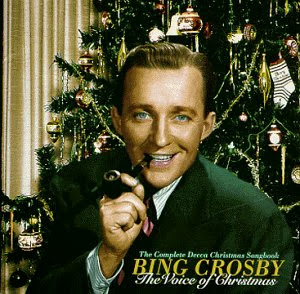The fine British reissue label JSP Records just released a single-CD collection of rare Kraft Music Hall broadcasts from the mid 1930s, the scarcity of which is well known to serious Bing Crosby fans. I recently published the following review of it in my classic jazz website, The Vintage Bandstand, and I now reprint it here because it also belongs in this blog.
The new JSP Records release, Kraft Music Hall: Selected Performances 1935-1936, is an
unexpected but wonderful surprise for all Bing Crosby fans and collectors, which I
have just received from the International Club Crosby. Although the medium
of radio was of paramount importance in Crosby's meteoric rise as a multimedia
star in the 1930s, unfortunately not too many broadcasts from this early period
of his career have survived. As the subtitle of this disc ("Lost radio
recordings rediscovered and released here for the first time") suggests,
this compilation attempts to fill that void by presenting material from early Kraft
Music Hall
programs that have not been heard since they first aired in 1935 and 1936. At
that particular point in time, December of 1935, Crosby's old boss, Paul
Whiteman, was still the host of KMH, and the singer was simply a guest on the
program. While the show was broadcast from New York, Bing's segments were
relayed from Hollywood, as we can hear on the first track of this album, which
has Whiteman introducing Crosby, who was not backed by Whiteman's outfit but by
the excellent, swinging Jimmy Dorsey orchestra. It appears that it was common
practice for Crosby during his guest spots to sing a medley of songs associated
with him or taken from one of his then-current movies, as well as a few tunes that
he had introduced or helped make popular, such as "On Treasure
Island," "Red Sails in the Sunset," "Dinah"
(unfortunately sans the Mills Brothers here), and "After You've Gone." As
John Newton observes in the liner notes, Bing sings the romantic ballad
"I'm Yours," which "fits neither category, but is nevertheless a
welcome addition" and would later be beautifully recorded by Dean
Martin.
 |
| Jimmy Dorsey leads the band on these shows |






















